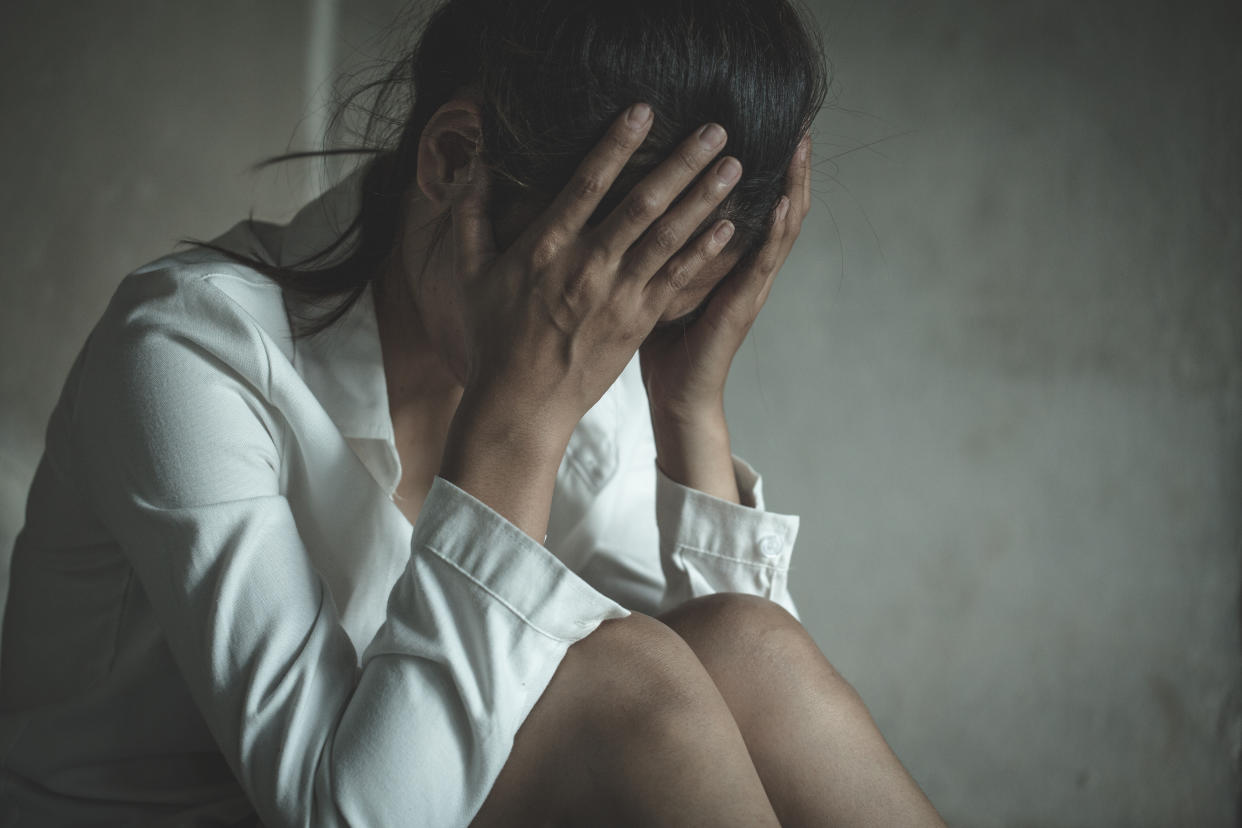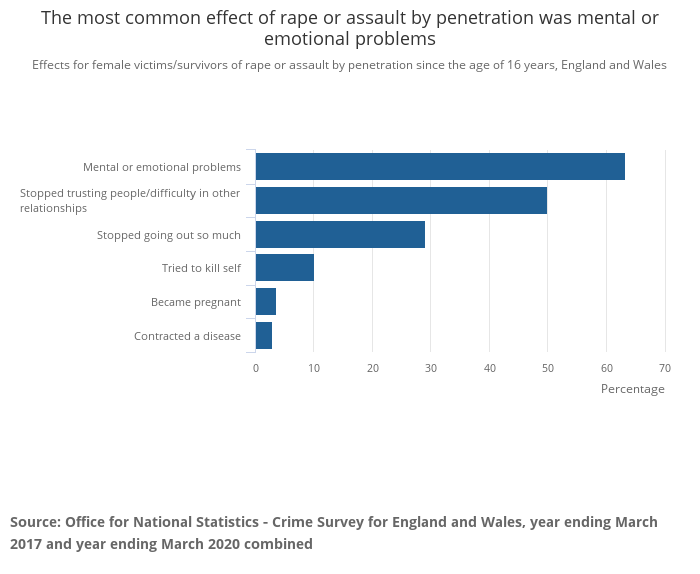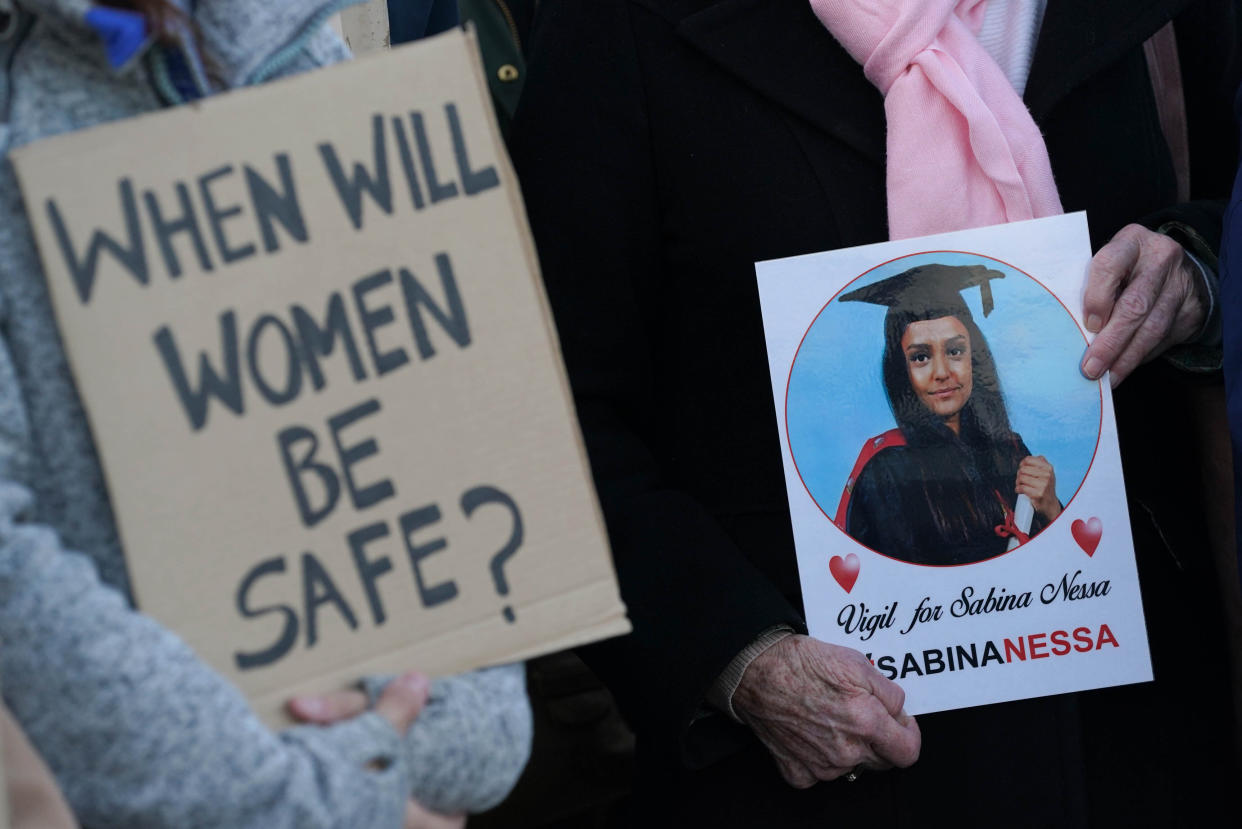1 in 10 rape survivors has tried to take their own life

One in 10 women who has survived rape has tried to take their own life, according to a shocking new study into the extent and impact of violence against women and girls in England and Wales.
The analysis by the Office for National Statistics (ONS) is the first of its kind to assess the lasting impact on female victims of crimes including domestic abuse, harassment and sexual violence.
Among victims of rape or assault by penetration (including attempts) since the age of 16 years, 63% reported mental or emotional problems, 50% stopped trusting people or had difficulty in other relationships and nearly 30% stopped going out so much,
A further 10% reported they had tried to kill themselves, 5% lost their job or gave up work and less than 5% reported becoming pregnant or contracting a disease.

Statistics from the Crime Survey for England and Wales showed an estimated 1.6 million women aged 16 to 74 years had experienced domestic abuse, approximately 7% of women.
It also revealed 3% of the female population aged 16 to 74 years in England and Wales had been victims of sexual assault (including attempts) and a further 5% had been stalked.
The statistics have remained at a similar level over the past decade, according to official data.
In total, 57% of women who had experienced abuse before the age of 16 years were also victims of domestic abuse when they were older, according to the crime survey.
The report showed how the nature of domestic abuse could lead a female victim to become homeless.
About one in 11 households in England (8.7%) who were homeless or threatened with homelessness reported domestic abuse as the main reason they struggled with accommodation, according to the 2019 to 2020 Statutory Homelessness Annual Report.
Recent cases involving Sarah Everard and schoolteacher Sabina Nessa have shone a spotlight on the issue of violence against women.
Metropolitan Police officer Wayne Couzens will spend the rest of his life behind bars after he abducted, raped and murdered 33-year-old Ms Everard near Clapham Common in south London in March.
Home secretary Priti Patel said this week an independent inquiry into Ms Everard’s murder will be given greater powers if the newly-appointed chairwoman Dame Elish Angiolini QC feels unable to fulfil her remit.
Read more:
Two thirds of young women harrassed in the last year, study shows
Home Secretary announces chairwoman of Sarah Everard inquiry
Met Police to review 300 sexual misconduct cases involving its officers
Ms Nessa, 28, was attacked as she walked through Cator Park in Kidbrooke, south-east London, on her way to meet a friend on 17 September.
Her body was discovered nearly 24 hours later covered with leaves near a community centre in the park.
Koci Selamaj, 36, from Eastbourne, who is charged with Ms Nessa’s murder, will appear in court on 16 December for a plea hearing.

ONS data also showed calls to the national domestic abuse helpline rose by more than a fifth during the coronavirus pandemic.
There were 49,756 calls to the helpline, run by Refuge, in England over the year to March 2021 – up 22% from the previous year, figures showed.
The rise was generally driven by peaks in calls during the national lockdowns, it said.
If you or someone you know has experienced abuse, help is available:
If you feel unsafe call 999 and ask for the police. If you cannot use a voice phone, you can text REGISTER to 999 and you will receive a text message which tells you what to do next.
Refuge can be called for free 24 hours a day on 0808 200 0247
National LGBT+ Domestic Abuse Helpline – 0800 999 5428 (run by Galop)
Welsh Women’s Aid can be called on 0808 801 0800
The Forced Marriage Unit can be contacted on 020 7008 0151
Mind can be called on 0300 123 3393 or emailed at info@mind.org.uk
Rape Crisis can be called on 0808 802 9999
The National Stalking Helpline can be called on 0808 802 0300 (run by Suzy Lamplugh Trust)
Samaritans can be called on 116 123 or emailed at jo@samaritans.org
The Survivors Trust can be called on 0808 801 0818
Victim Support can be called on 0808 168 9111
Respect offers a helpline for people who are worried they may be perpetrating domestic violence it can be called on 0808 802 4040
Watch: Ex-solicitor general to lead Sarah Everard inquiry into police failures



